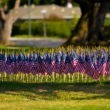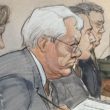The Hammer Strikes Back—NBC’s Today Show isn’t known for putting its guests in the hot seat—unless your name is Tom Cruise. Yet there was host Meredith Vieira on March 20, sinking her teeth into former House Majority Leader Tom DeLay. “You say to fight, and the name of your book is No Retreat, No Surrender. But didn’t you give up your battle?” she asked the man known as the Hammer. When DeLay claimed to have simply “changed arenas,” Vieira spoke of the Republican Party’s current travails and pressed, “So what responsibility do you think you bear?”
None, apparently. DeLay’s new memoir/polemic/diatribe blames everyone—except himself—for his meteoric fall after an equally meteoric rise. Those at fault include Newt Gingrich (“an ineffective Speaker”); Dick Armey (“blinded by ambition” and “useless to the cause”); George W. Bush (“no conservative”); Bill Clinton (“slimy”); and, of course, the Democrats (“communists”).
DeLay’s reputation hasn’t fared well since he stepped down as majority leader last year. When the head of the American Conservative Union appointed DeLay to the advocacy organization’s leadership, four board members resigned in protest. He still faces corruption charges in Texas. CNN turned down an offer to make him a regular political commentator. He doesn’t even write his own blog. Said one Texas political blogger: “DeLay titling his book No Retreat, No Surrenderis like Jack Abramoff calling his memoirs Ethics and Honesty.”
The Boom Goes Bust—The housing boom of 2003-2005 has imploded. A key factor in the downturn is subprime loans (lenders offer enticing-sounding mortgages that actually carry high interest rates) to people with low incomes or poor credit. What Alan Greenspan once praised as the “democratization of credit” has become an especially dark aspect of a widening gap between rich and poor. The National Association of Realtors is predicting a 33 percent rise in home foreclosures this year over 2006. Meanwhile, home sales have dropped to their lowest level since June 2000, with the number of unsold homes reaching a 16-year high, according to the Commerce Department. In Greeley, Colorado, a once-prosperous small city emblematic of the trend, the number of foreclosures jumped from 1,155 in 2004 to 2,073 last year. A three-bedroom home there purchased for $29,000 in 1990 now has a $138,000 mortgage on it. As a result, a record number of Americans are defaulting on their loans, victims of marketing schemes the New York Times called “blatantly unwise or dishonestly portrayed to buyers.”
The subprime market is largely unregulated—and the laws that do exist are rarely enforced. “Our nation’s financial regulators were supposed to be the cops on the beat, protecting hard-working Americans from unscrupulous financial actors,” said Christopher Dodd (D-CT), chairman of the Senate Banking Committee. “Yet they were spectators for far too long.” At a hearing convened by Dodd, a top Federal Reserve official all but concurred. “Given what we know now, yes, we could have done more sooner,” said Roger Cole of the Fed’s banking supervision division. But for many first-time home owners, it is already too late. The Economistmagazine recently suggested that June’s National Homeownership Month in America be renamed National Foreclosure Month.
Neither Here Nor There—It’s one of the Bush Administration’s favorite tag lines: we’re fighting terrorists in Iraq so that we don’t have to fight them on our soil. “If we fail there,” President Bush said of Iraq during a recent news conference, “the enemy will follow us here.” Yet this line, like so much of what Bush has told us about Iraq, happens to be false, say intelligence experts. Even members of the president’s own Cabinet concur. In February, Senator Lindsey Graham (R-SC) asked the new Director of National Intelligence, Mike McConnell, whether “al-Qaeda-type elements” would follow U.S. forces if they withdrew from Iraq. McConnell offered a succinct response: “Unlikely.”
Ninety percent of the fighters in the group Al-Qaeda in Iraq are Iraqi, U.S. intelligence officials in fact contend. An Iraqi friend told the Spectator that months ago, and the Washington Postconfirmed it in a story on March 18. The Iraqi branch “poses little danger to the security of the U.S. homeland,” the Post reports. They have their hands full battling the Shiite majority. They do not take orders from Osama bin Laden. The foreign fighters in the group represent a marriage of convenience, not ideology. Just because they want us out of there doesn’t mean they plan to follow us here.






0 Comments